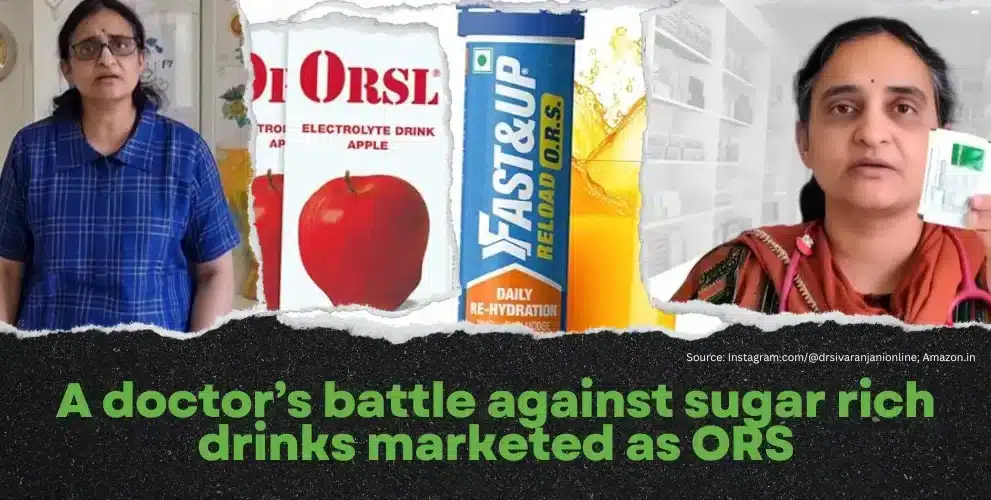ORS controversy: How a doctor’s long battle led to the FSSAI decision
The controversy highlights a critical public health concern in a country where diarrhoea remains the third leading cause of childhood mortality, accounting for 13 per cent of deaths among children under five
Author
Author
- admin / 3 months

- 0
- 6 min read

Author
In a landmark decision aimed at curbing misleading labelling in India’s food and beverage industry, the Food Safety and Standards Authority of India (FSSAI) has prohibited the use of the term “ORS” or “Oral Rehydration Salts” on any food product unless it strictly adheres to World Health Organization (WHO) standards. This regulatory intervention comes after years of persistent advocacy by the Hyderabad-based paediatrician Dr Sivaranjani Santosh, who has been campaigning against sugar-rich drinks falsely marketed as oral rehydration solutions (ORS).
The controversy highlights a critical public health concern in a country where diarrhoea remains the third leading cause of childhood mortality, accounting for 13 per cent of deaths among children under five. Proper rehydration during episodes of diarrhoea and vomiting can be life-saving. However, misleading product labelling has blurred the line between medically recommended ORS and commercially sold beverages that bear the same name but fail to meet essential standards.
What is the FSSAI order on ORS?
On October 14, FSSAI issued a comprehensive directive prohibiting the use of the term “ORS” in conjunction with any food product name, whether standalone, with a prefix or suffix, or as part of a trademark. This order mandates the immediate withdrawal of all previous permissions granted to food business operators (FBOs) that allowed them to use “ORS” as part of a brand name, provided they included a disclaimer stating, “The product is Not an ORS formula as recommended by WHO.”
The FSSAI’s move rescinded two earlier orders issued on July 14, 2022, and February 2, 2024, which had temporarily allowed such use with disclaimers. The regulator clarified that the use of “ORS” in any food product—fruit-based drinks, non-carbonated beverages, or ready-to-drink packs—constitutes a violation of the Food Safety and Standards Act, 2006, and related regulations. According to FSSAI, this misleads consumers through false, ambiguous, or deceptive labelling, which can have serious implications for public health.
The directive also instructs authorities to ensure strict compliance with labelling and advertisement rules under the Act. Products violating the regulation may face penalties under Sections 52 and 53 of the Food Safety and Standards Act.
Dr Sivaranjani Santosh, whose legal campaign triggered this reform, hailed the decision. She stated in a social media video that “No one can use ORS on their label unless it is a WHO-recommended formula, and no one can sell it right from today.”
WHO recommendations on ORS
Oral rehydration solutions are a simple yet essential intervention for preventing dehydration during diarrhoea. The World Health Organization (WHO) recommends a standard Reduced Osmolarity ORS, carefully formulated with precise concentrations of electrolytes and glucose. Each litre contains 2.6gm of sodium chloride, 1.5gm of potassium chloride, 2.9gm of trisodium citrate dihydrate, and 13.5gm of anhydrous glucose, giving a total osmolarity of 245 mOsm/L.
In contrast, several commercial products marketed as ORS contain dangerously high levels of sugar, often around 120gm per litre, with nearly 110gm being added sugar. Their electrolyte balance is inconsistent with WHO norms, sometimes providing only 1.17gm of sodium, 0.79gm of potassium, and 1.47gm of chloride per litre. Such formulations fail to provide effective rehydration and may worsen health outcomes, particularly for children who are most vulnerable to dehydration-related complications.
The widespread availability of these mislabelled products has contributed to public confusion. Pharmacies across the country often stock tetra packs of beverages marketed as ORS, which are mistaken for WHO-recommended solutions. This not only misguides consumers but also undermines efforts to reduce preventable deaths
The long battle
The FSSAI’s recent directive is the culmination of nearly a decade-long campaign by Dr Sivaranjani Santosh, a paediatrician from Hyderabad. Her fight began when she observed a worrying trend: sugar-laden beverages being marketed as ORS, despite lacking the proper balance of electrolytes and glucose recommended by the World Health Organization (WHO). Recognising the serious public health risks, she began raising concerns with food regulators, manufacturers, and the medical community.
In 2022, Dr Santosh took her concerns to the courts by filing a Public Interest Litigation (PIL) in the Telangana High Court. The petition challenged companies that were marketing sweetened fruit juices as ORS without adhering to WHO standards, highlighting that these drinks contained excessive sugar and inconsistent electrolyte levels—posing potential health hazards, particularly for children.
The case drew the attention of then Secretary of the Ministry of Health and Family Welfare, Rajesh Bhushan, prompting both judicial and regulatory scrutiny. As a result, FSSAI initially issued a directive on April 8, 2022, restricting the use of ‘ORS’ on food labels and advertisements. However, after several companies challenged the directive through writ petitions, the regulator temporarily relaxed the rule on July 14, 2022, allowing companies with registered trademarks to continue using ‘ORS’ in their product names until a final ruling was issued by the Controller General of Patents, Designs and Trademarks.
‘A welcome step’
Dr Amit Gupta, Senior Neonatologist and Paediatrician at Motherhood Hospitals, Noida, welcomed FSSAI’s latest directive, calling it “a much-needed and very good step” to protect children’s health.
He explained that a proper ORS is designed to replace the exact electrolytes and fluids lost during diarrhoea or dehydration. However, many companies have been altering these formulations. “To make it more palatable for children, some manufacturers started adding flavours or extra sugar,” Dr Gupta said. “This might make the drink tastier, but it completely defeats the purpose. The high sugar content can actually worsen diarrhoea instead of treating it.”
According to him, such flavoured versions, often marketed with apple, mango or banana taste, are misleading and nutritionally imbalanced. “These are not true ORS formulations; they are more like soft drinks with a bit of added sodium,” he added.
Dr Gupta advised parents and caregivers to be extremely cautious when buying ORS. He emphasised that only WHO-approved, unflavoured formulations should be used. “Whenever parents tell me they gave ORS, I always ask which one. Many don’t realise that the ones with fruity flavours are not real ORS. It should never be a fruit-based or non-carbonated drink. Only proper WHO-labelled ORS should be used,” he said.
He concluded that the FSSAI’s strict regulation will help curb the rampant misuse of the term ORS in the market. “This is a big market that should not be promoted under misleading claims,” he said.
Do you have a health-related claim that you would like us to fact-check? Send it to us, and we will fact-check it for you! You can send it on WhatsApp at +91-9311223141, mail us at hello@firstcheck.in, or click here to submit it online










